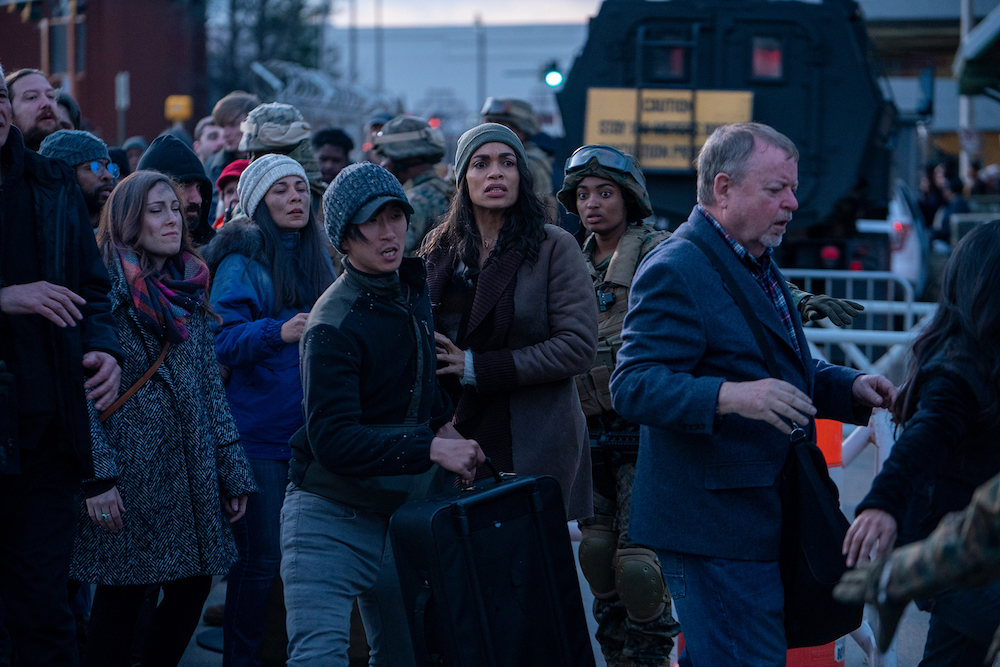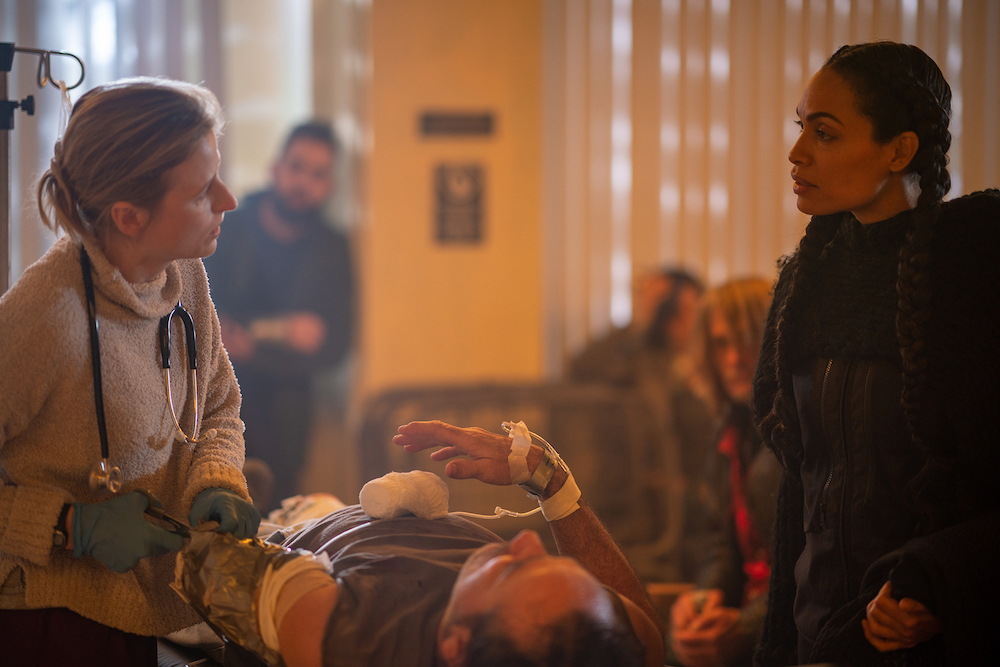An Uncivil War | HBO’s 'DMZ' depicts what a conflict-divided USA might look like today
(Minor spoilers ahead.)
“It's amazing how a steady supply of toilet paper can turn a man into a god,” said one character when describing the Chinatown warlord of what was once New York City.
It’s lines like this, delivered somewhere between ridiculous melodrama and astonished somberness (a tongue stuck out to recent events), that inform DMZ’s best moments. It’s a wretched shame that these moments, albeit there’s plenty of them, can’t rescue the hurried and shorthand effect a very paltry number of episodes delivers.
DMZ looks both gorgeous and grimy, its visuals still evoke the urban decay of a New York minute, but with the disturbing emptiness of conflict zones that are always pregnant with violence.
“Sayang” was a word that I kept saying aloud after finishing an episode. Sayang talaga.
This HBO adaptation was based on the comics by Brian Wood and Ricardo Burchnielli. The series was one of the best things I’d read under the DC-Vertigo imprint, not just because it played out a narrative that a real life USA always seemed be on the brink of, but also because the character arcs were compellingly human.
Wood and his illustrator cohorts never took for granted how the sometimes farcical reasons for war still meant death and displacement. DMZ’s four-part Max Original limited series is an amalgamation of the ensemble characters and storylines that Wood explored in his doomsday scenario: what if a second Civil War broke out in the USA? What if Manhattan became the No Man’s Land between the two great factions? A place theoretically free from fighting. The De-Militarized Zone.
Eight years ago, the war fractured America and medic Alma “Zee” Ortega (Rosario Dawson) when she was living in NYC with her son, Christian. But on that Evacuation Day, with residents fleeing the fighting between the Free States and the United States, Alma became separated from Christian. She hasn’t been able to find him in those long years since the chaos of trying to board the last of the buses out of the city. She’s long suspected that he was likely left behind in what is now the lawless DMZ. But it’s not like getting back in there would be easy.
We begin the series when Ortega learns from a reliable source that Christian may still be in Manhattan. Negotiating and bribing her way into the DMZ, she begins a journey to find him in what is now a lawless country where two main warlords preside over all the other factions: Parco Delgado (Benjamin Bratt) of the Spanish Harlem Kings and Wilson Lin (Hoon Lee), Godfather of Chinatown.
Postured between a modern day Escape From New York and Station Eleven, another HBO Max original, DMZ evokes a similar dystopic drama feel. Something has overturned civilization or culled the population. Executive produced by Emmy nominee Roberto Patino, Oscar nominee Ava DuVernay, and Paul Garnes, DMZ looks both gorgeous and grimy, its visuals still evoke the urban decay of a New York minute, but with the disturbing emptiness of conflict zones that—strewn bullet casings on the streets and sometimes skulls atop spears—are always pregnant with violence.
We’ll never know how much a full-length series could have played out since DMZ is one of the bruised victims of filming during the COVID lockdown years. It was originally planned as an ongoing series, but production got stopped in March 2020 after getting the pilot in the bag. When they resumed in late 2021, their budget had been slashed so much that there was only enough for a four-episode limited series. It’s like the showrunners and producers sat down at a crucial meeting when they all got back from isolation to look over their paltry budget and said: okay, what can we do with this stellar cast and our modest finances?

The narratives here are so rich and detailed that it could have easily used at least four more episodes to reach denouement. Hence, this most unfortunate casualty of pandemic disruption has plenty of plot twists that seem rushed. The character development feels unearned, especially between the third (“The Good Name) and fourth (“Home”) episodes. That it has a coherent story at all is nothing short of amazing. A testament to me of the strength of the original material, the indomitable will of the showrunners, and of course the astounding class of the main actors.
One of the pillars is the dignity and gravitas of Rosario Dawson as a mother who is guilt-ridden with the thought that she had carelessly abandoned her son during Evacuation Day. While her role could have easily led her down a soapish caricature, it’s her vulnerability as she tackles her mission that carried the day for me. That also indicates a breathing world to move around, brought to life by the power hungry community leaders of the DMZ in Parco Delgado and Wilson Lin. As Ortega navigates her way into the DMZ, she is warned that she will find “people at their worst.” Instead she discovers a thriving community. Despite the omnipresent shadow of war between the FSA and the USA, hundreds of thousands carry on. Children play on the streets, bread is still getting baked, windows are still getting cleaned in spite of the armed men and tanks within earshot. That this fragile peace and availability of basic resources for survival is due to both Lin and Delgado’s goons isn’t lost on Ortega. That she shares history with both men is something that stretches credulity but is a great setup for a nigh Shakesperian climax.
There is poverty in the time it takes to explore a future where Americans have cannibalized their own democracy, tearing apart their own country apart that was made entirely plausible by the 1/21 Capitol Hill attacks.
Ortega steps into this ongoing praxis seizure just as Election Day is due in a few weeks. Recognition for Manhattan as its own sovereign state hangs in the balance and the two candidates are also, you guessed it, Lin and Delgado.
A ripped and slim Benjamin Bratt imbues the charismatic ex-military Latino gangbanger Delgado with just enough softness through his PTSD. He also has a hankering for what he calls “unity in the DMZ.” His proto-fascist political catchphrases are delivered through a party atmosphere, his velvet glove buoyed by liquor and tacos to the remaining neighborhood gangs of New York. But it’s Hoon Lee as Wilson Lin who’s the breakout scene stealer. Wilson was one of the great characters in the original comics, an old man with an army composed of his many grandsons. Someone who’d jumped from low level Triad enforcer to the only Tong in the game through a seized cache of gold. Though his time in the series Warrior as the merchant Wang Chao gave him a cred boost, it’s on DMZ that he's given the screen time he’s due. And he makes every second count, bringing to life a former nurse turned protector of Chinatown, crafting his exchanges with Ortega and Bratt into flashbangs.
DMZ’s problems don’t lie with the talent on-screen. Rather that there is poverty in the time it takes to explore a future where Americans have cannibalized their own democracy, tearing apart their own country apart that was made entirely plausible by the 1/21 Capitol Hill attacks.

Real meaning in art takes time to bed down, to complicate and then unravel its own Gordian knots. There’s also some minor continuity problems with the visualizing of the spaces. In a few scenes people go down stairs but later they are staring at a high view of the NYC skyline.
That said, one of the most captivating storylines is about the children of the DMZ, something echoed in Ortega’s search for her son Christian. The arc of the orphaned black boy Odi (Jordan Preston Carter) who’s haunted by the ghost of his wise grandfather and his early steps into a more caring, still humane manhood despite being surrounded by violence and, as a corollary, toxic masculinity will easily make viewers emotionally invested. Ortega’s interactions with him fundamentally changes her too, shifting her mission from just being able to save her son to realizing that she has more at stake in this community. Especially when she exacerbates and unbalances the existing power dynamic of the DMZ neighborhoods at such a volatile time leading up to elections. That the politics of the city becomes suddenly very personal for her is a stroke of genius by the screenwriters. Will she take responsibility for her actions or abandon Manhattan as many already have?
It just feels like DMZ abruptly ends just when the drama is getting warmed up. Even as it presents a dystopic future that easily could have been about people building communities in an oppressed place and condition, it never gives into the excesses of something like say The Walking Dead—a series that became too indulgent and enamored of its own admittedly cliché survivalist fictions, despite how a zombie apocalypse seems less of a fin de siècle fantasy now.
DMZ’s showrunners have done an excellent and minimalist interrogation of NYC at its best, at its worst, and as itself when left to its own devices. Please HBO, the DMZ’s artful depiction of life during wartime is way too thought-provoking not to be given its due of a full-length series.
Stream DMZ only on HBO GO.


